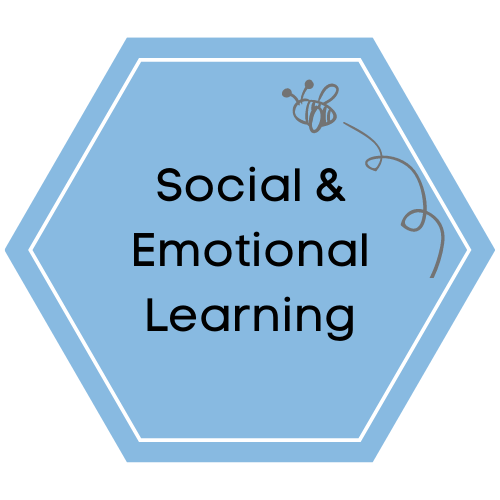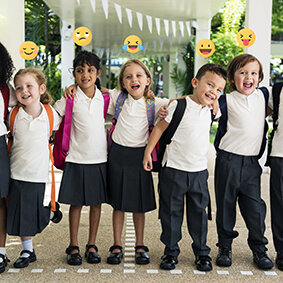
Wellbeing Resources
The wellbeing of the school community is an integral factor in effective learning and teaching. It promotes a sense of meaning and purpose in life that is supported by the spiritual dimension of a Catholic school.
"‘Wherever the waters flow, they bring health.” Ezekiel 47:9
DOBCEL Student Wellbeing Framework
The DOBCEL Student Wellbeing Framework includes the following five elements: School Culture, Inclusive and Support Relationships, Social Emotional Learning, Learner Agency and Empowerment and Family and Community Partnership.
The DOBCEL Student Wellbeing Framework can be accessed here.
Wellbeing Activities for Parents and Children During Home Learning
Catholic Education Ballarat is proud to launch ‘Wellbeing Activities for Parents and Students During Home Learning’. Healthy wellbeing promotes a sense of meaning and purpose in life that is supported by the spiritual dimension of Catholic schools. It is especially important to ensure that children and young people’s wellbeing is looked after in times of uncertainty and stress. Supporting wellbeing not only helps children and young people to feel happier and less anxious, it will also help them to have positive interactions with the rest of the family and to learn more effectively.
The activities in this workbook are designed to give students themselves, as well as parents/carers and school staff suggested ways of supporting the students' wellbeing - either at home or as part of classroom activities at school.
Principal, Student & Staff Wellbeing
Support for the wellbeing of principals, teachers, other school staff and students.
Principal Wellbeing
The Diocese of Ballarat recognises and supports the significant ministry of principalship in our schools. Resources to support principal wellbeing can be accessed here.
Student Wellbeing
Student resilience and wellbeing are essential for both academic and social development. Resources to support student wellbeing can be accessed here.
Staff Wellbeing
Taking care of ourselves and one another develops confidence, improves engagement and encourages innovation. Resources to support staff wellbeing can be accessed here.
Critical Incident Management
The new DOBCEL Emergency and Critical Incident Management Policy provides a definition of the three types of incidents (Emergency, Major incident and Critical incident). Schools will continue to manage Emergency and Major incidents using their Emergency Management Plan (EMP). If a Critical incident arises involving a life-threatening or significant property damage event, then CEB must be notified by calling Michael Trainor on (03) 5337 7109 or by emailing: critical.incident@dobcel.edu.au. The Critical Incident Management Team will then be activated to support the school Principal in responding to the incident.
Emergency & Critical Incident Management Policy
Download the DOBCEL Emergency and Critical Incident Policy from CEVN.
Grief and Children - Better Health Channel
Resources and fact sheets to support children experiencing grief and loss.
Seasons for Growth
Factsheet offering guidance for adults to support a child who is grieving.
Bereavement Care Centre
Comprehensive and accessible counselling and support services for the terminally ill and their families, and for those recently bereaved.
Suicide Postvention Resources: Complete Toolkit
This toolkit offers evidence-based and practice-informed guidelines.
Positive Student Behaviour
Classroom environment is one of the most important factors affecting student learning. A positive environment is one in which students feel a sense of belonging, trust others and feel encouraged to tackle challenges, take risks and ask questions.
School-Wide Positive Behaviour Support
Resources for school-wide positive behaviour support (SWPBS) to assist schools to improve social, emotional, behavioural and academic outcomes for children and young people.
Restorative Practice
Restorative Practice focusses on helping young people become aware of the impact of their behaviour on others. Access Restorative Practice resources here.
Catholic Education Commission Victoria Resources
CECV resources to support positive behaviour in the classroom.
Exclusionary Discipline
QUT - The effects of exclusionary discipline and why it should only ever be used as a last resort.
Psychology Services - Catholic Education Ballarat
The primary focus of a psychologist in an educational setting is on assessing behaviour and educational competence and the conditions that enable and support it.
The Role of the CEOB Psychologist
An overview of how Catholic Education Ballarat Psychologists can assist schools.
Make a Referral
Catholic Education Ballarat provides access to referral services and consultative support to schools, to promote the development of inclusive practices that cater for students with diverse learning needs.
Physical & Mental Health
Guidelines and resources to support schools in the areas of positive mental and physical health and management of health conditions.
Mental Health
Resources, information and strategies for helping children and young people achieve their best possible mental health.
Physical Health
Catholic Education Victoria resources, information and strategies for helping children and young people achieve their best possible physical health.
Identity and Growth
Catholic Education Victoria resources for creating safe, nurturing and inclusive environments for all students.
National School Chaplaincy
Catholic Education Victoria guidelines for National School Chaplaincy Program.
Social & Emotional Learning
Social and emotional learning teaches students techniques to process and manage emotions as well as essential social skills. It encompasses everything from goal setting to stress management, and it provides both children and adults with tools they can use to express themselves authentically and appropriately. SEL is critical for building healthy relationships, communicating effectively and living a meaningful life.
Social and Emotional Learning Resources
Resources to help integrate SEL into the academic curriculum for an engaged classroom.
Trauma Informed Classrooms
Resources to help foster positive classroom learning environments and mitigate the impact of trauma.
Protect - Child Safety
Guidelines and resources to support schools in response to Ministerial Order 870: Child Safe Standards and CECV Commitment to Child Safety.
Catholic Education Victoria Resources
Guidelines and resources to support school in response to Ministerial Order 870.
Protect
Identifying and responding to all forms of Child Abuse.
Child FIRST
Child FIRST is an easily accessible, community-based point of entry for children, young people and families needing support.
Four Critical Actions
Chart to guide action in responding to incidents, disclosures and suspicions of child abuse.
eSafety Commissioner
Online professional learning for staff who work in schools. Programs cover the latest online safety research, case studies and teaching strategies.
Commission for Children and Young People
Online professional learning in the areas of the Child Safe Standards and the Reportable Conduct Scheme (RCS).
Information for Families
Helping engage families to strengthen social emotional skills and create opportunities for children to identify and express their emotions at home.
Parent Engagement in Learning Factsheet
Factsheet outlining the strong evidence linking parent engagement with improvements in academic achievement for children of all ages.
The Differences Between Parent Involvement and Parent Engagement
Larry Ferlazzo, co-author of ‘Building Parent Engagement in Schools’ describes the difference between parent involvement and engagement.
Progressing Parental Engagement School Factsheet
This factsheet offers information and strategies to assist schools to strengthen a culture of parental engagement.
Positive Parenting Program
A toolbox of parenting strategies and ideas to empower parents without ‘telling’ them what they should do.
Attendance
School attendance guidelines, including resources and templates to promote school attendance and manage school absences.
Every Day Counts
Flowchart overviewing the role of the principal in implementing reforms to attendance and enrolment.
AITSL Research and Evidence
Understanding the relationship between attendance and achievement can help school communities promote positive attendance habits.
Catholic Education Commission Victoria Resources
CECV resources to support student attendance.
Out of Home Care
Guidelines for schools to support students placed in statutory Out-of Home-Care.
LOOKOUT
LOOKOUT Education Support work with schools, care services, Child Protection, case workers and carers to lift educational outcomes for children in care.
Out of Home Care Partnering Agreement
An agreement between DHHS, DET, CECV and Independent Schools Victoria concerning management of students in Out of Home Care.
Educational Needs Analysis Guide
This guide assists schools to meet the requirements of the Partnering Agreement in assessing the needs of a student in Out of Home Care.
Calmer Classrooms
Resources to help meet the needs of young people who have experienced trauma, especially those in Out of Home Care.


















































